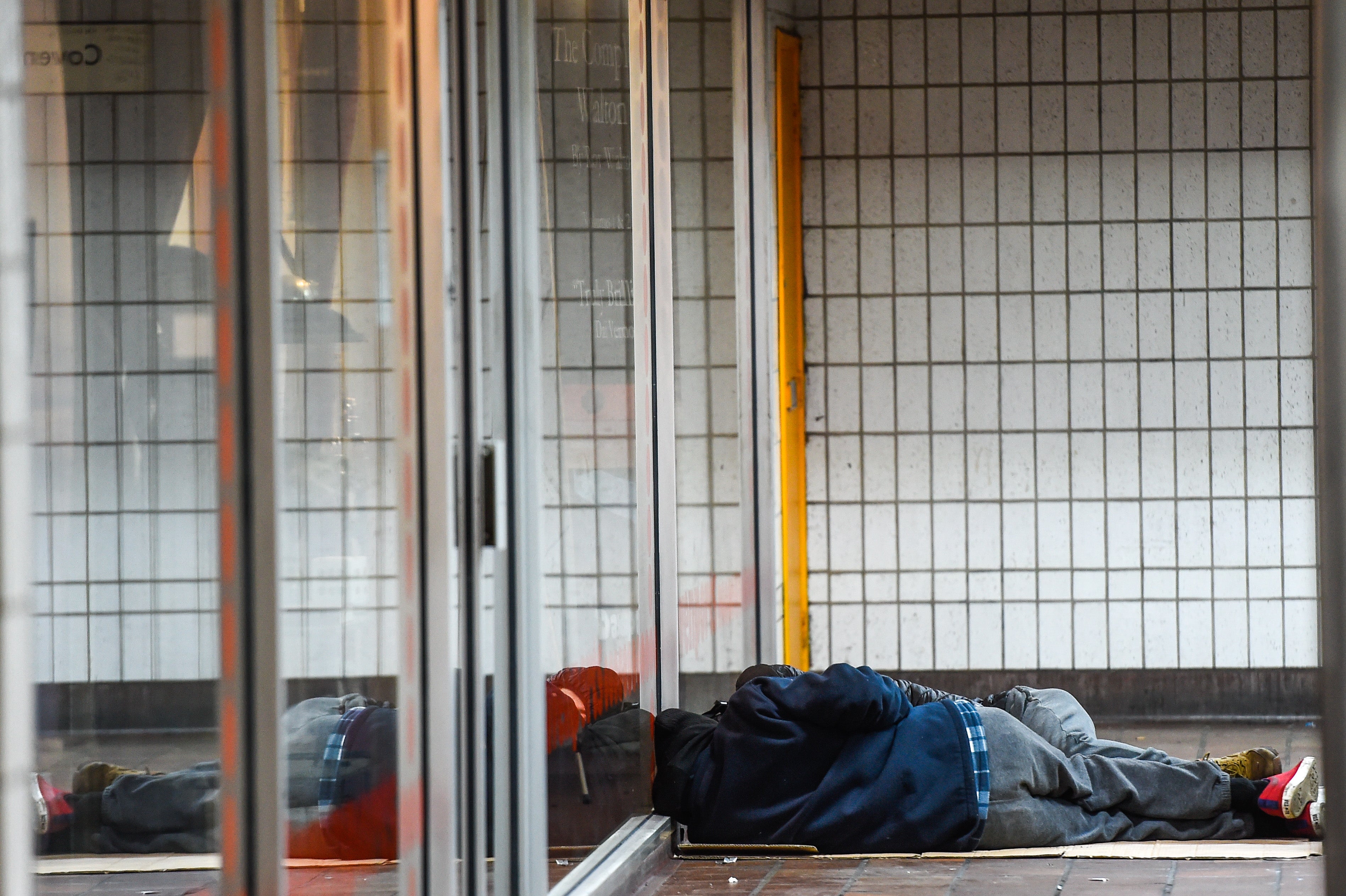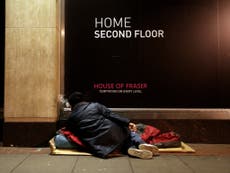‘Tragedy in the making’: Charities warn rough sleepers will have no protection during second lockdown
Ministers urged to re-introduce Everyone In scheme, which housed thousands at start of pandemic

Your support helps us to tell the story
From reproductive rights to climate change to Big Tech, The Independent is on the ground when the story is developing. Whether it's investigating the financials of Elon Musk's pro-Trump PAC or producing our latest documentary, 'The A Word', which shines a light on the American women fighting for reproductive rights, we know how important it is to parse out the facts from the messaging.
At such a critical moment in US history, we need reporters on the ground. Your donation allows us to keep sending journalists to speak to both sides of the story.
The Independent is trusted by Americans across the entire political spectrum. And unlike many other quality news outlets, we choose not to lock Americans out of our reporting and analysis with paywalls. We believe quality journalism should be available to everyone, paid for by those who can afford it.
Your support makes all the difference.Charities are warning of a “tragedy in the making” due to the lack of measures in place to protect rough sleepers during the second lockdown.
Ministers are being urged to re-introduce a scheme that housed homeless people during the first months of the pandemic, amid warnings that without urgent action, people will be forced to either sleep in the cold or take refuge in night shelters where social distancing is impossible.
Since the start of the coronavirus outbreak, the government has moved nearly 30,000 homeless people into emergency, self-contained accommodation, including hotels, under what has been termed the “Everyone In” scheme.
The scheme has been largely successful, and many people who were placed in hotels have now been moved into more permanent accommodation. According to a study in The Lancet, an estimated 266 deaths were avoided during the first wave of the pandemic among England’s homeless population thanks to the Everyone In scheme.
However, thousands of people are said to have fallen homeless since the pandemic started, with figures published by the Combined Homelessness and Information Network (CHAIN) last week showing that 1,901 people in London were rough sleeping for the first time between July and September 2020.
For these individuals – many of whom have fallen homeless due to the economic fallout of the public health crisis – there are no measures in place to protect them during the second lockdown.
To make the situation worse, night shelters that would usually be open to rough sleepers during the winter months will be unable to operate safely due to Covid-19 restrictions.
Research from charity Crisis in June showed that more than half of frontline services had seen a rise in homelessness, with nearly three-quarters saying demand for their services had increased since the start of the pandemic.
Jon Sparkes, chief executive of Crisis, warned that unless the same “transformative” action taken under the Everyone In scheme was repeated, councils and charities would be left with “no option” but to open night shelters, where people would be at greater risk of catching and becoming seriously ill with coronavirus.
“With the second wave of the pandemic affecting much of the country, we are now in a position where many more people are being pushed into homelessness as businesses and livelihoods are impacted,” he said.
“It’s absolutely essential the government offers the same support we saw through the Everyone In scheme, funding accommodation where people who would otherwise be sleeping rough can safely self-isolate this winter.”
Lucy Abraham, chief operating officer at London-based homelessness charity Glass Door, said the lack of any plan to house rough sleepers in emergency accommodation this winter was “very worrying”.
“The advice from government is to stay home and save lives, but what does this mean for someone who is homeless? Glass Door’s frontline staff are already seeing the impact of people losing their jobs and homes, with an increase in people who have never been homeless before turning to the charity,” she said.
“The funds currently set aside is less than what was available last winter. During a global health pandemic and at a time when we know many people are facing losing jobs and homes, the lack of a strong response from central government is a tragedy in the making.”
Ms Abrahams said that while the charity had developed new ways of providing shelters – in single-rooms - this was a more expensive model, and they could only offer 88 people a place to sleep per night, compared to 170 last winter.
“We need a centralised, coordinated plan from government […] We need properly funded self-contained, Covid-secure accommodation, which we know is the safest way to protect those who would otherwise be sleeping rough during this period,” she added.
Seyi Obakin, chief executive of Centrepoint, echoed her concerns, saying: "It’s vital that ministers act swiftly to ensure the resources made available for Everyone In are again put in place as we re-enter a national lockdown.
"The government has shown what can happen when the political will is there to support the most vulnerable in our society. If we are to avoid a spike in coronavirus cases amongst those facing homelessness and those who are trying to help them, then ministers must urgently find that same sense of purpose again.”
The London Mayor is also calling for the Everyone In scheme to be re-introduced, warning that not doing so would risk "all the good work of the spring going to waste".
A spokesperson for the Mayor of London said: “During the first lockdown the ‘Everyone In’ policy saved countless lives and helped London avoid the spread of coronavirus amongst homeless people that was seen in other world cities. Limiting the spread of the virus amongst rough sleepers also helps prevent outbreaks in the wider community.
“But despite this success the Government appears to have overlooked or ignored the need for a similar policy to protect our vulnerable rough sleepers as we enter a second lockdown. This is a gross oversight, especially as the winter weather makes sleeping on the streets even more dangerous at this time of year.
It comes after medical bodies warned last month that rough sleepers could be caught up in a “humanitarian disaster” this winter and that lives would be “at risk” without urgent government action to protect people from the “double threat” of coronavirus and cold weather.
Josh, 24, a young person from South West London, has been sleeping rough during the pandemic while working as a carer. He is receiving some support from charity New Horizon, but says there’s no shelter or stable housing available due to peak of homelessness caused by Covid-19.
“At night you wait and wait for someone from outreach who say they come to see you and then they don’t. You’re just stuck and unsafe. It’s hard to say the least,” he said.
“There is hardly any temporary accommodation and worst of all, young people are being ignored while also being made vulnerable by the same system. We need change.”
Cllr David Renard, Local Government Association housing spokesperson, said that while councils continued to work “tirelessly” to get people sleeping rough off the streets and into safe accommodation, they were concerned about a rise in rough sleeping over winter.
“With recent guidance signalling that congregate night shelters are only available as a last resort, councils need clarity on resources available to them to give people safe, self-contained accommodation over the winter,” he added.
Mr Renard called on ministers to use the Spending Review to address the funding gap facing councils, and temporarily remove the No Recourse to Public Funds condition – which prevents thousands of people from accessing welfare support due to their immigration status.
Up to half of homeless people in some areas have an NRPF condition attached to their immigration status, meaning that — although many in this position can legally live and work in the UK — they are not eligible for financial or housing support.
A spokesperson for the Ministry if Housing, Communities and Local Government said: “Some of the most vulnerable people have been supported into safe accommodation since the start of the pandemic to help keep them safe: this work is ongoing and hasn’t stopped.
“We continue to work with councils, charities and other partners - backed by over £700m of government funding this year alone - to protect the most vulnerable in society.
"This includes a new £10m Cold Weather Fund to support councils to tackle homelessness this winter and bring forward self-contained accommodation where possible. We have been clear that night shelters should only be used as a last resort where not doing so would endanger lives."




Join our commenting forum
Join thought-provoking conversations, follow other Independent readers and see their replies
Comments